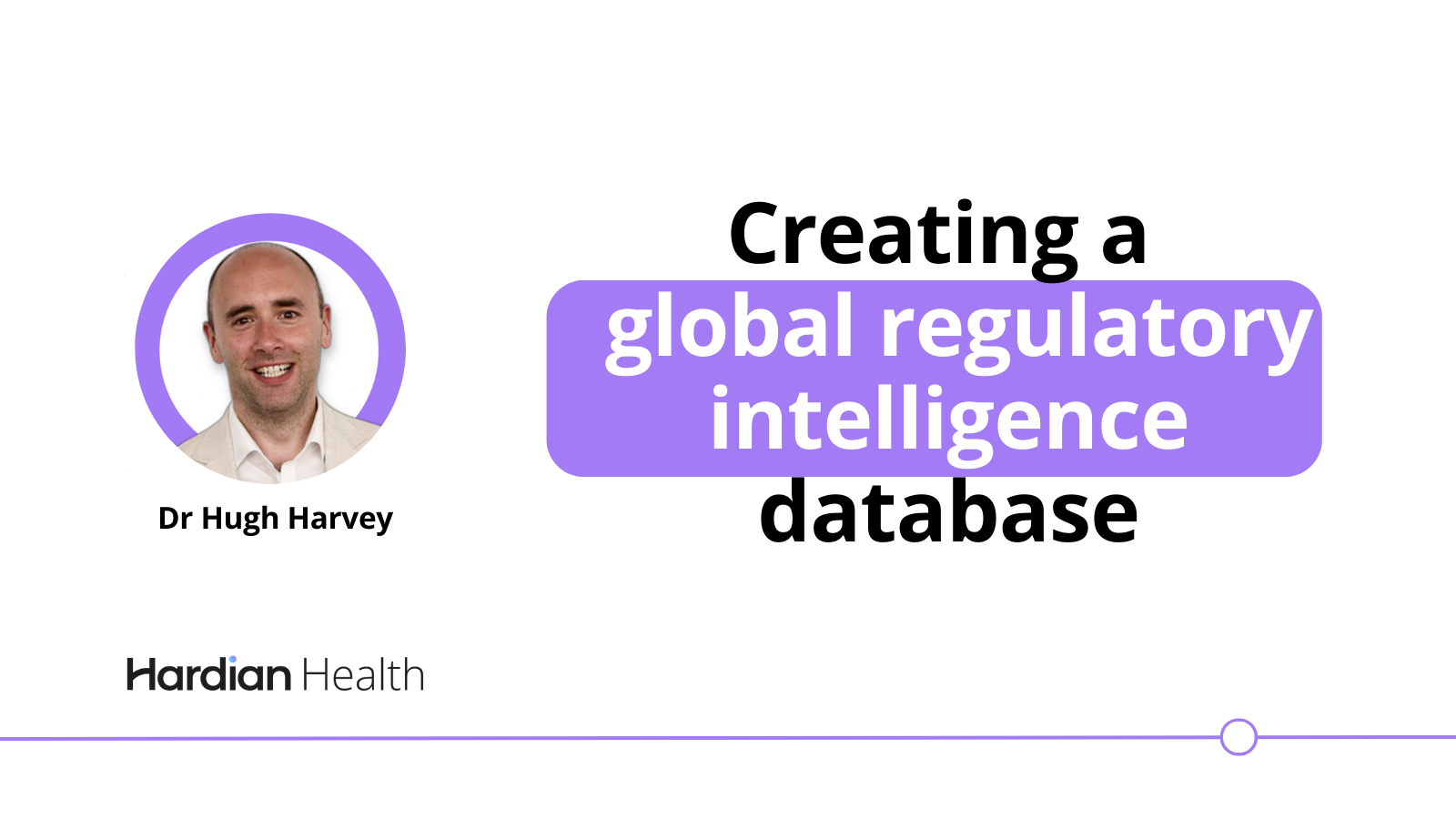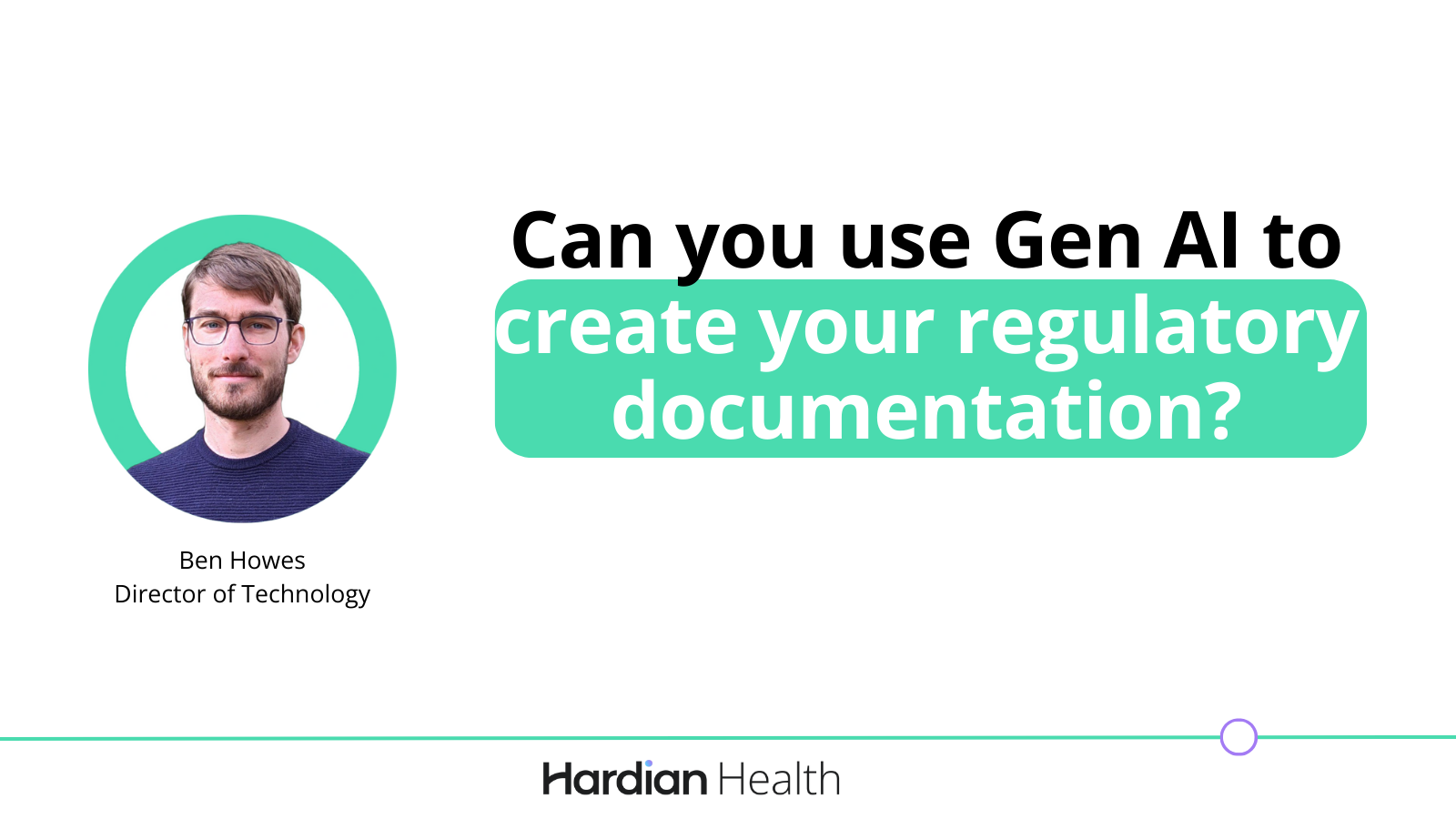Insights
Filter posts
All Categories Clinical Strategy Regulatory Intellectual Property Health Economics
Creating a global regulatory intelligence database
Many countries around the world currently have no central database of their medical devices, or have ones that are not quite fit for purpose. We are building HaRi - a global regulatory intelligence database - bringing medical device regulatory data into modern era of innovation. Our hope is that by raising the veil of transparency across all medical devices, the entire industry can benefit.
Can you use Gen AI to create your regulatory documentation?
We're witnessing a rapid rise of the use of generative AI in the medical device regulatory space to produce and review documentation. This raises the question - If all compliance documentation is created by a machine, and all compliance documentation is audited by a machine - has any compliance actually happened?
MyCardium’s quadruple regulatory cleared cardiac AI platform
MyCardium AI is a rapidly growing UK-based company delivering advanced core-lab services, now with two CE-marked and FDA-cleared AI medical devices - 1CMR Pro and EchoConfidence - built on decades of leading academic research. With Hardian Health as a strategic partner, MyCardium navigated complex regulatory pathways with exceptional speed and success. How did they do it?
What regulatory challenges do Software as a Medical Device Platforms face?
Many healthcare software products are described as “platforms.” But when it comes to Software as a Medical Device (SaMD), regulatory challenges quickly emerge. From classification to conformity assessments, platforms that host or enable MDSW apps—particularly those involving AI—must navigate complex and evolving frameworks across jurisdictions like the UK and EU.
Regulatory requirements for SaMD across jurisdictions. Where to start?
SaMD regulatory requirements are fast evolving, with international efforts to harmonise frameworks still taking shape. Yet manufacturers must navigate jurisdiction-specific rules—especially as the US aligns more closely with ISO 13485:2016 in its Quality System Regulation. Whether you're targeting EU, US, or emerging markets, understanding the SaMD regulatory landscape is a critical first step.
World's First Regulatory Clearance for a Large Language Model Medical Device
Recently, we hosted an exclusive webinar featuring Dr Vera Roedel (CEO) and Professor Heinz Wiendl (Co-Founder) from Prof.Valmed®. They have achieved the significant milestone of securing the world's first regulatory clearance for a large language model (LLM) as a medical device.
Do You Need Clinical Data to Get a CE Mark for Your AI Medical Device?
Do AI medical devices need clinical data for CE mark? Many teams building AI that predicts, measures, prioritizes, or triages ask whether prospective clinical data is required under the EU MDR. Dr Ankeet Tanna outlines when clinical investigations are essential, when indirect clinical benefit and non‑clinical evidence can be enough.
AI-Triage Devices: Essential Buyer's Guide for Healthcare
Buying AI-triage software isn't like purchasing regular tech. These tools are medical devices with strict regulatory requirements. Our guide (co-produced with Visiba Group) breaks down everything you need to know…
Why do so many AI startups struggle with regulatory strategy?
From scribes and image analysis to triage, diagnosis, and treatment planning, the technical capability emerging from startups is already there. What’s less clear is a credible plan for how these tools will enter regulated clinical markets - and remain there.
AI Healthcare Regulation across borders
While regulatory developments in the US, UK, and EU, such as the FDA’s AI January 2025 draft guidelines and the EU’s AI Act, have set prominent benchmarks, significant innovation and diverse regulatory strategies are evolving rapidly across Asia, Africa, and South America.
The ISO standards you need to know for SaMD - 2025 update
ISO and IEC standards are applicable to every industry, not just healthtech. But healthtech has its own standards that SaMD and AIaMD developers need to conform to.
What you need to know about risk management for Software as (or in) a Medical Device.
Following on from previous blogs, What you need to know about traceable requirements for medical devicesand How much documentation does my Software as a Medical Device regulatory submission really need?, it’s time to now think about how to organise the complementary risk management, particularly for Software as a Medical Device (SaMD) and Software in a Medical Device (SiMD).
Understanding the Five Stages of Regulatory Grief
Anyone dealing with regulatory hurdles goes through the same 5 stages - denial, anger, bargaining, depression and acceptance. Here's how to smooth the journey.
What you can and can't say about your AI medical device
In an industry where patient safety and regulatory compliance are non-negotiable, making unverified or misleading claims isn’t just bad practice – it can lead to hefty fines, product recalls, and serious reputational damage.
How many AI-enabled medical devices are approved for use in the UK?
Once a device has been approved by an approved body in the UK, the question then becomes, how can a member of the public find out if a device is approved for use, and what it is approved for? Indeed, can we find out how many AI medical devices are actually on the market in the UK?
How to effectively implement and manage Quality Management Systems - Pt 2
In part 1, we outlined the key concepts of a quality management system (QMS), explored what a QMS is – and what it is not – discussed why a QMS is required by law and who needs it, and provided an overview of the structure of a QMS. Now, in part 2, we'll move on to the practical side of implementing and managing a QMS effectively. Now then, back to Kipling’s six honest men…
Big challenges meet bright solutions at the Hardian Health Tech Summit
Last month we hosted our third Health Tech Summit, bringing together our healthtech community at the London Institute for Healthcare Engineering for an afternoon filled with engaging discussions, expert insights, and canapés with a view!
Every regulatory AI medical device standard you need to know
As AI is increasingly integrated into more and more medical devices, the regulations and standards are also maturing and developing. Often we get asked ‘What are the most important standards we need to know?’, so here is the definitive list.


















